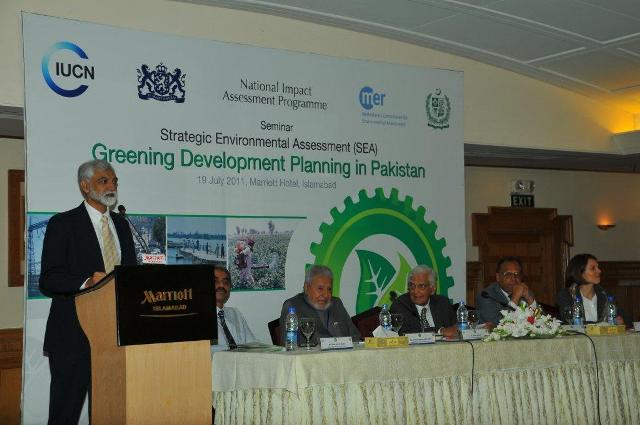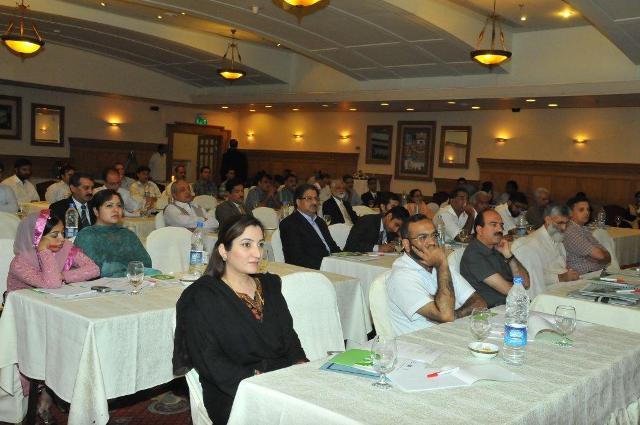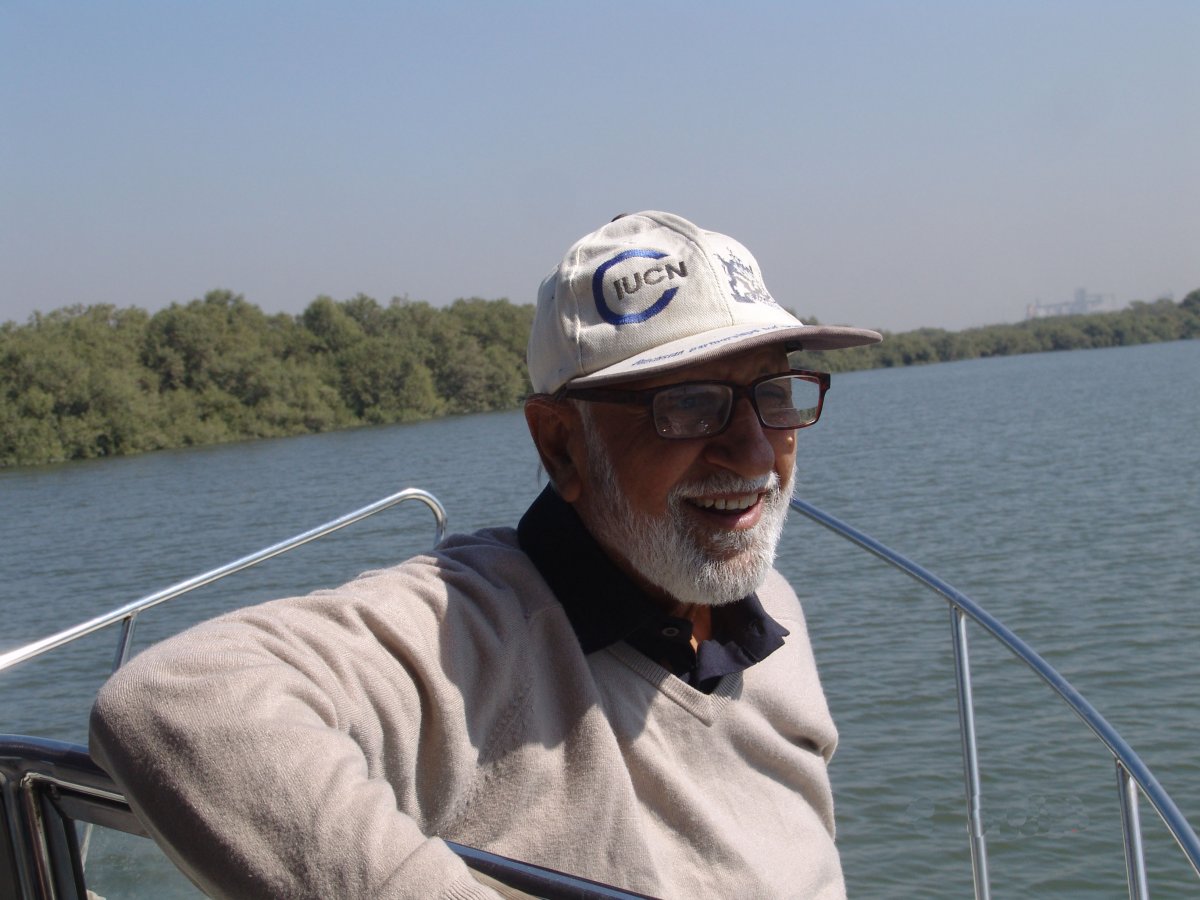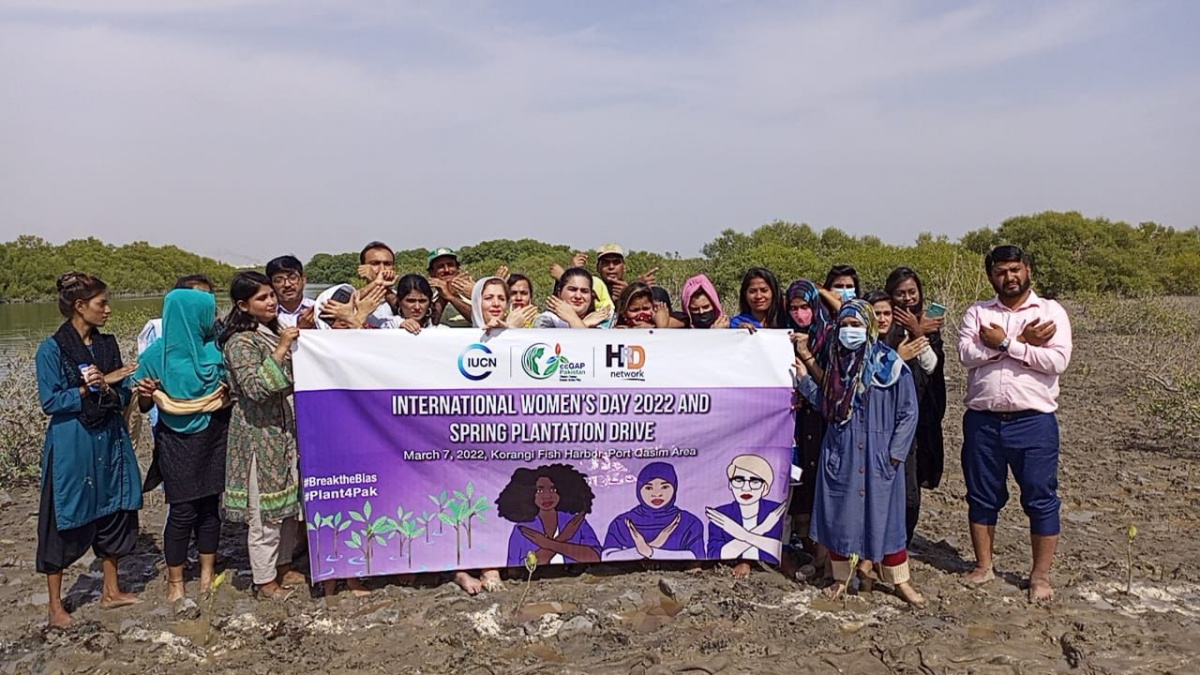Greening Development Planning in Pakistan
The Government of Pakistan, under the auspices of Planning Commission, in collaboration with the International Union for Conservation of Nature (IUCN) organized a half-day Seminar titled: “Strategic Environmental Assessment – Greening Development Planning in Pakistan”, at a local hotel in, Islamabad.
The seminar was attended by senior government officials, civil society representatives, lawmakers, academia, media and eminent personalities. The seminar was aimed at sensitization of senior decision makers and other stakeholders on the role of Strategic Environmental Assessment (SEA) in development planning. Dr. Ishfaq Ahmad, Advisor, Science and Technology, Planning Commission of Pakistan was the chief guest and Mr. Ghulam Mohyuddin Marri, Member, Planning Commission of Pakistan co-chaired the event.
The seminar was organized under the ongoing National Impact Assessment Programme (NIAP) being jointly implemented by the Government of Pakistan and IUCN. The programme aims to contribute to sustainable development in Pakistan by strengthening Environmental Impact Assessment (EIA) and introducing Strategic Environmental Assessment (SEA) in Pakistan’s development planning process. NIAP has four partners namely: the Pakistan Environmental Protection Agency (PEPA); Environment Wing, Ministry of Environment; Environment Section, Planning Commission and IUCN Pakistan. Technical assistance to the programme is being provided by the Netherlands Commission for Environmental Assessment (NCEA) while the project is being funded by the Embassy of the Kingdom of Netherlands (EKN).
Dr. Aurangzeb Khan welcomed the participants and outlined the process through which environment has been recognized and integrated into the governmental set up. He highlighted that with understanding and perception for environmental issues increasing, various new projects were launched which resulted in creating a better understanding and awareness about environmental issues. Consequently, a need was felt to introduce and strengthen the impact assessment into the development planning process, for which the Dutch Government offered their assistance. This led to the launch of the National Impact Assessment Programme in 2009.
Mr. Ahmed Saeed, the NIAP Project Manager who outlined the aims, objectives and outcomes of the project, explained that the key objective is to promote Environmental Impact Assessment and to introduce understanding of SEA among relevant stakeholders.
Dr. Bobbi Schijf, Technical Advisor from NCEA, delivered a detailed presentation on SEA. She explained that though the concept of strategic environmental process was relatively new, it had already been accepted globally particularly in the developed world. Dr. Schijf emphasized that the SEA process involves understanding the environmental dimensions of planning processes and that policy making and planning needs to be looked at from an environmental point of view. Comparing SEA with EIA she clarified that while EIA was a project level tool, focusing on the quantitative process, SEA was a tool for policy and decision makers, more qualitative and focused on outcomes as opposed to the effects.
Dr. Schijf also added that because SEA has a broader outlook, and acts as a preventive tool by devising ways to address the needs of all the stakeholders, it is on the agenda of all the international forums and agreements.
Dr. Parvaiz Naim a leading Environmentalist and an expert on SEA delivered a presentation titled: ‘SEAing is believing’, in which he focused on integrating SEA practices into the institutional development process in Pakistan. Dr. Naim reiterated that while Environmental Impact Assessment (EIA) has been a legal requirement in Pakistan for over two decades, Strategic Environmental Assessment (SEA) is more effective as it aims to integrate environmental considerations into decision-making during the formulation of policies, plans and programmes. He emphasized the need to take SEA forward in Pakistan and to involve federal and provincial stakeholders. Dr. Naim concluded that there was need to explore the potential of SEA as a deterrent at the planning level, against environmental degradation.
The presentations were followed by an interactive and informative discussion and Question and Answer session in which the participants expressed their views and opinions on the introduction of SEA into the planning process.
The future outlook of the environment sector, and impact assessment in particular, was also discussed. It was pointed out that the devolution of the Ministry of Environment was to be taken as an opportunity to address the provincial governments and grass root communities.
The stakeholders were also informed that under NIAP, provincial EIA experts had been hired in all provinces for the purpose of building capacity of the provinces and working on more effective outreach.
In the closing address, the Chief Guest Dr. Ishfaq Ahmed stressed the need for better management since Pakistan as world’s 6th most populated country was highly vulnerable to the effects of climate change and global warming. He stressed on the need to address the ongoing energy crisis and financial recession in the country. He expressed optimism on the ‘New Growth Strategy’ which is being developed by the Planning Commission and appreciated the role of IUCN and the Planning Commission in taking SEA forward. The co-chair Mr. Ghulam Mohyuddin Marri expressed the need for better coordination and exploring potential and also appreciated the role of IUCN, Planning Commission and Netherlands Commission for Environmental Assessment (NCEA) for their efforts.
For more Information please contact:
Arfa Zaheer Azmat
Deputy Project Manager/ Advocacy Coordinator -NIAP
Islamabad Programme Office
IUCN, International Union for Conservation of Nature
and Natural Resources- Pakistan
H. No 21, Street 88, Sector G- 6/ 3
Islamabad, PAKISTAN
Tel: +92 51 2271027- 34
Fax: +92 51 2271017
Email: arfa.zaheer@iucn.org





